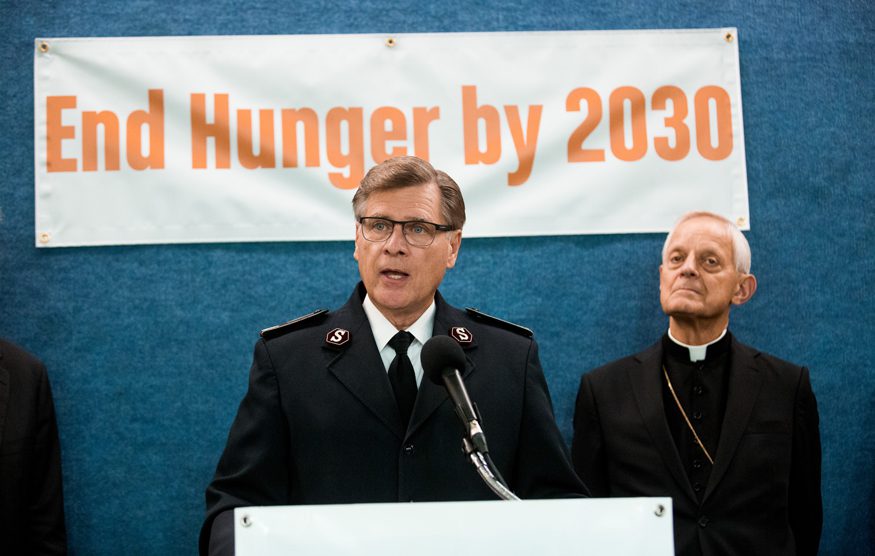An Interview With The Salvation Army’s David Jeffrey
On the eve of Pope Francis’ visit to the U.S. in September, Bread for the World gathered about 100 top religious leaders from Christian, Jewish, and Muslim denominations and organizations across the country in Washington, D.C., for a summit about ending hunger. Many of them committed themselves to ending hunger by 2030 by signing the Interfaith Religious Leaders’ Pledge to End Hunger.
Among the faith leaders at the summit was David Jeffrey, National Commander of The Salvation Army in the United States. Excerpts from an interview he had with Marco Grimaldo, Bread’s senior national associate for Latino engagement, follow.
“…to preach the Gospel of Jesus Christ and to meet human needs in His name without discrimination.”
from The Salvation Army mission statement
Q. How does your faith inform how or why we seek an end to hunger?
David Jeffrey: I think one of the most poignant passages for me is Matthew chapter 25. When Jesus is talking about the end of time, and he’s talking about when the king of glory gathers all the nations together, that he’s going to separate the sheep and the goats as a shepherd would. He’s going to say to those on his right, “Come and receive the inheritance I’ve prepared for you from the beginning of the world.”
The reason they were to receive it, he says, is, “Because when I was hungry you gave me something to eat. When I was naked you clothed me. When I was sick you visited me. When I was in prison you came to see me.”
Jesus said, “When you did it unto the least of these, my brothers and sisters, you did it unto me.”
Jesus came and was basically homeless after his early years of living in Nazareth. He became an itinerant preacher, traveling throughout Galilee and Jerusalem. He had a real love and concern for the poor. I think if he were with us today he would be among the homeless. He would be reaching out and touching them. He would be among those in our society that would be considered outcasts because he had a real concern for the poor, because when he himself came, he left the glories of heaven and he became like one of us.
Q. What would it mean if we could see an end to hunger in our lifetime?
DJ: It would mean a great deal…Even though we’ve made great progress in the past 20 to 25 years by cutting the poverty level in the world by half, we still have a long way to go. There’s still over a billion people around the world who are living in abject poverty, and there are 47 million people in the United States who live in poverty… today in America we’ll [The Salvation Army] feed 161,000 meals. Tonight we’ll sleep 29,000 people in our shelters, and with basic social services, we’ll serve about 18 million people this year. It’s about one person every two seconds, but we want to do more than just maybe meet people one time and just meet their need on that one particular day. But how can we break this cycle of intergenerational poverty?
Q. How can we be stronger advocates for hungry people?
DJ: First of all, people have to be aware that there is a need. I think people need to educate themselves and read about what can be done. I think folks can volunteer to help those that are needy, and I think that we can all be involved in advocating for the poor by writing our congressman or speaking out on behalf of the poor…
We can have our relationship to God, but I think it was John Wesley that said, “All holiness is social holiness.” It’s how we treat each other. It’s how we respect each other that really makes the difference. I think one of the basic tenets of all faiths is that we have to be concerned for other people.
The Salvation Army’s annual red kettle campaign began at Thanksgiving and will continue through Advent and conclude on Christmas Eve. Seeing the ubiquitous red kettle for the collection of change at grocery stores and other shopping places is a reminder of the many organizations across the country and around the world that are helping to address hunger and poverty along with Bread for the World.
Editor’s note: Bread’s church relations department maintains the organization’s relationship with The Salvation Army, one of its national religious partners.



